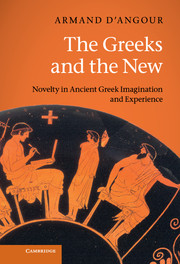Book contents
- Frontmatter
- Contents
- Acknowledgements
- Introduction
- Chapter 1 New, new, new
- Chapter 2 Loosening the grip of the past
- Chapter 3 The transformations of Kaineus
- Chapter 4 Old and new
- Chapter 5 Nothing new under the sun
- Chapter 6 The birth of Athena
- Chapter 7 Inventions of Eris
- Chapter 8 The newest song
- Chapter 9 Constructions of novelty
- Chapter 10 So what's new?
- References
- General index
- Index of Greek terms
- Index locorum
- References
Introduction
Published online by Cambridge University Press: 07 September 2011
- Frontmatter
- Contents
- Acknowledgements
- Introduction
- Chapter 1 New, new, new
- Chapter 2 Loosening the grip of the past
- Chapter 3 The transformations of Kaineus
- Chapter 4 Old and new
- Chapter 5 Nothing new under the sun
- Chapter 6 The birth of Athena
- Chapter 7 Inventions of Eris
- Chapter 8 The newest song
- Chapter 9 Constructions of novelty
- Chapter 10 So what's new?
- References
- General index
- Index of Greek terms
- Index locorum
- References
Summary
Everything clever has already been thought, one must only try to think it again.
GoetheThe original idea for this book came to me when I was working in a family-run manufacturing company in the 1980s. The constant pressure to innovate in products, designs and organisational structures aroused in me a mixture of feelings, positive and negative, about the generation and reception of novelty. This experience led me to wonder whether the Greeks in classical times had encountered a similar ambivalence about innovation. It seemed likely that, although the acknowledged artistic and intellectual innovations attributed to the ancient Greeks fell into a different category from novelty in a modern commercial context, the principles of innovation and the range of human responses to it would at some level have been similar. Above all, I was bound to learn something interesting and useful about processes of innovation, the nature of novelty and the sensibility of newness from studying these things in the ancient context.
My initial investigations showed that although the exceptionally innovative nature of the Greek achievement was taken for granted by students of Greek history and culture, little scholarly consideration was given to how the Greeks felt about and reacted to the new in its wide range of manifestations. One reason for this neglect appeared to be the general consensus among classical scholars and historians that the Greeks were averse to innovation and shunned the new. I regularly found views to this effect expressed, if only en passant, in books, articles and commentaries. The supposition that the Greeks did not care for the new seemed strikingly at odds with the widely acknowledged innovativeness of classical Greek thought, art and literature. ‘If novelty had been as much detested by the Greeks as it is by us, what classics would there be?’ Horace asks in his Epistle to Augustus (written c.12 bce). The Roman poet's focus is on literary novelty, but the same question could be asked in respect of the other classics that comprise the Greeks’ enduring legacy of art, science and philosophy.
- Type
- Chapter
- Information
- The Greeks and the NewNovelty in Ancient Greek Imagination and Experience, pp. 1 - 10Publisher: Cambridge University PressPrint publication year: 2011

